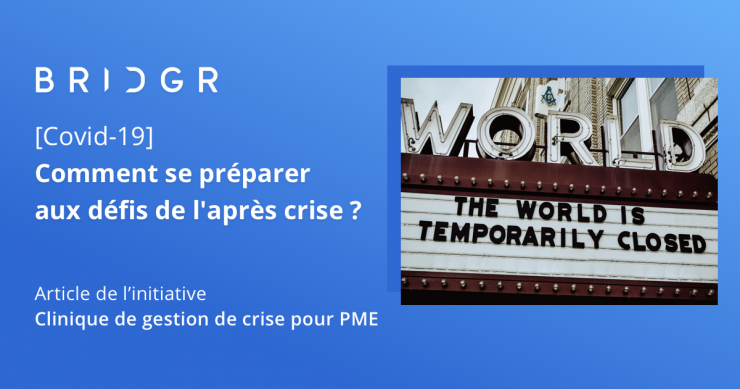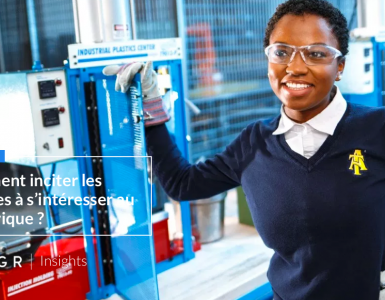In these times of pandemic, we are all aware that we will no longer have the same “reality” after containment. The operating system of the majority of businesses will undergo major transformations and employers and employees will have to review their work habits. It then becomes essential to develop the necessary capacities to meet the requirements of the post-VIDOC-19 era. But how can we prepare for this and, above all, ensure that we have the best tools?
According to experts, many aspects of the world of work will be put to the test at the dawn of this new and uncertain situation. Every company will have to prepare itself to see major transformations, not only in its work environment, but in the entire organizational system we are experiencing today.
To begin with, as a result of the many layoffs and the sharp decline in productivity, employers will have to reshape their modes of governance by becoming more aware of their employees’ reality, while demonstrating more empathy, listening and transparency. They will also be called upon to review their company’s organizational structure since they will not be able to immediately rehire the staff they were forced to set aside at the beginning of the crisis. At the same time, the roles and responsibilities of the remaining employees will have to be redefined along with operating modes that will become organic, flexible and virtual in order to facilitate small teamwork. Probably not reducing the concern of entrepreneurs about their company’s ability to produce as much as before.
In addition to this internal restructuring, managers will have to reinvent the styles of interaction with external collaborators, customers and all other stakeholders. New social realities will emerge and will progressively impose themselves within companies.
As far as the business model is concerned, it will undergo a considerable transformation to adapt as best as possible to a completely new market reality, shaped by completely different consumer habits and a list of competitors that will no longer resemble the one at the beginning of the year. The new players that will replace the old competition will bring a wave of freshness to the market, prompting companies to redouble their efforts to remain competitive. All of these changes will necessarily include a digital shift that will be accelerated, taking a prominent place in work processes. Technology will be more indispensable than ever, whatever the sector of activity.
Despite this whirlwind of change, many business leaders do not give up and continue to work to survive until the end of containment in the best possible way.
At the beginning of March everyone was busy with the rhythm of the hands of a watch without having the time to take a moment to question themselves. From traveling to meet potential clients, to the projects that followed one another, to the constant worry of reaching the set objectives, the entrepreneurs did not have the opportunity to press the “pause” button to give their business a breath of fresh air. That’s why, taking advantage of this global slowdown, it’s time to reinvent oneself and work on all the projects that are gathering dust, but above all to reflect on the raison d’être of one’s company and its future actions.
BRIDGR team offers you some ideas to keep the machine running and above all to encourage you, as an entrepreneur, to bring your boat to port despite the bad weather.
Take a step back
- The world has stopped “spinning” temporarily, so take it as an opportunity to take stock and observe your accomplishments. It’s a good time to look back on all the successes and failures of your business. It’s also a great time to take stock and check if your mandate and mission are still being respected.
- Don’t hesitate to evaluate your financial partners and the relevance of their offers; it is important that your company be at its best.
- To keep your morale up, contact your fellow entrepreneurs and check in with them. Make sure everything is going well on their side and support them if it isn’t.
- Don’t forget the long list of projects you’ve set aside somewhere in your workspace. Try to cross off the outstanding tasks to put your agenda in order.
Review the relevance of your products and/or services
- With work slowing down and most projects on hold, it would be wise to take the time to evaluate the products and/or services your company offers. Knowing that the majority of the population is at home and therefore consumes more Internet, why not develop satisfaction surveys, for example targeted surveys around the usefulness and ecological impact of your products or services to measure if it finally has an impact on the preferences of your consumer and thus bring this more that the company did not have the opportunity to introduce earlier?
- Based on the results of the surveys, why not improve your products and/or services to better satisfy and expand your customer base.
- Take the time to invest in local production, this will allow you to have a positive ecological impact resulting in a favorable societal impact.
Adapt the work process
- Re-design your company structure and the roles of each person as well as the processes for completing tasks. Consider using more scheduling software and video conferencing platforms to adapt to new work habits.
- Thoroughly review the work tools that could be improved, particularly in terms of technology.
- Integrate remote working and make it more commonplace.
Prepare for change
- As predicted, the current crisis will push many companies around the world towards active digitalization. It is therefore time to digitize your work tools (online document signing, platforms that promote teleworking, planning software, management tools, etc.) to avoid falling behind.
- Implement new technologies adapted to new hygiene standards, for your supply chain for example.
Take action!
- Conduct tests with your current or potential customers to see if there are any possible areas for improvement for new versions of your product and/or service to make sure they are ready when the crisis ends.
- Develop scenarios and define a precise action plan. Don’t forget to be prepared to take direct action without wasting time.
- Produce videos for customers and/or the general public to help them learn more about your company and everything you offer. You can also write digital white papers about your industry.
- Update your website by refreshing your content and adding new features.
Despite all the predictions made by experts about the challenges of post-VIDOC-19, one thing is certain, no one can really guarantee what will happen next. As an SME, start-up or entrepreneur, the best thing to do is to equip yourself judiciously to be prepared for any eventuality.
Although not all entrepreneurs have the same ability to adapt to an uncertain situation such as the one we are experiencing, it should not be forgotten that competition, too, is at a standstill at the moment. All companies are experiencing the same crisis at the same time, and will have to face the same transformations it will impose on them. Beyond all the changes they will undergo, will companies really be ready to see their business model and their general way of operating being metamorphosed?
It remains to be seen to what extent the post-COVID-19 will be different from the “before”.
While waiting for the post-COVID-19 period, do not forget that to face the crisis, the BRIDGR team has set up digital transformation clinics to help SMEs, start-ups and entrepreneurs. Discover the different solutions that you could quickly benefit from thanks to our partners and experts in digitization. We’re here for your business, hang in there and take care of yourself!






